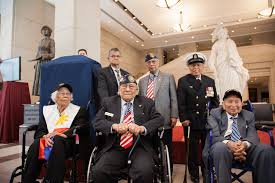
Veterans have a battle long after the literal battle they are fighting is over. And for some, it never ends. The battle is for recognition for their service in various wars. Take World War II, more than 260,000 Filipinos fought for the United States and most did not return home to their families. It is a tragedy and it’s not the only one these veterans suffered. The tragedy of not being recognized as veterans does take a toll on their families, those who served whom are living. Their sacrifices weren’t broadcasted like other veterans were. Some retribution is happening because this past Saturday, surviving veterans and their families if the veteran in their family was no longer living, , received Congressional Gold Medals, to honor those who served. This particular civilian award is given to an individual or a group of individuals that have had a significant impact on U.S. culture. To say that Filipinos were misrepresented and disrespected is a vast understatement. This past Saturday, 25 veterans were honored for their service in World War II. “They served their country. They died for their country. So, this is about duty to country worth dying for,” said Maj. Gen. Antonio Taguba, a Filipino and a retired U.S. Army Officer. And the honor and respect for others, especially in this sector, is important as anything else. If there’s no respect or honor, we have failed people that need it most.
It’s important to combine historical significance, respect and honor when talking about veterans, especially those who fought so hard for our country and for the simple recognition. It is unacceptable for this issue to be an issue. History does have a part in the lack of recognition.
Congress in 1946 passed a Rescission Act, which in turn, did two things to them. One, it took away their dignity and their honor, by declaring they were not in active duty, thereby they were not entitled to receive their benefits … and it also took away their U.S. nationality, even though they were part of the U.S. as a colony.” This is criminal, if not legally criminal. "Although [President Harry] Truman had to issue the Rescission Act after the war, people do not understand the impact of that on the community because a lot of people lost their citizenship and their benefits ... As (Filipino veterans') families migrated and their children grew older, they didn't have pension. They didn't have a legacy to leave for their children," Christy Poisot said,
Region 7 Filipino Veterans Recognition and Education Project director shares her thoughts on the subject. "It’s important to recognize failure and then make changes to give people what they deserve. We have the opportunity to turn a page and honor, love and respect people for their acts of service, regardless of their nationality or who they are."
You can find more information about this issue on the Filipino Veterans Recognition and Education Project at https://www.filvetrep.org/



